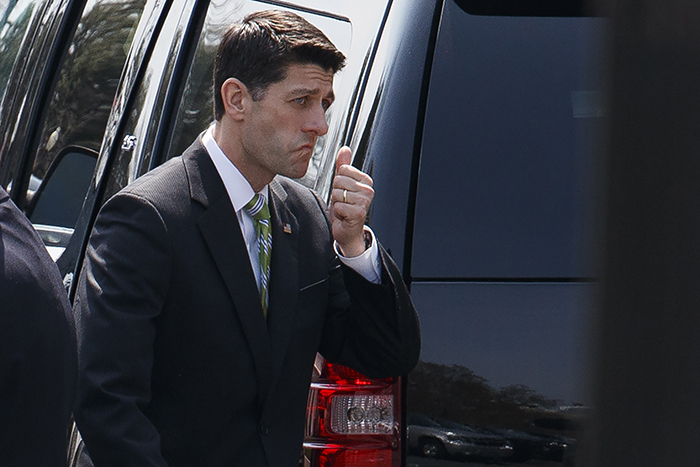
House Speaker Paul Ryan of Wis. leaves the White House in Washington, Friday, March 24, 2017, after meeting with President Donald Trump © Evan Vucci/AP Photo
Pictured here is a thumbs-up paired with a frown. Paul Ryan, the Speaker of the House, has departed from a meeting with President Donald Trump, during which he’d had to explain that there would be no chance of passing the American Health Care Act. Around noon, Ryan had “rushed” to the White House, desperate for permission to bail on the Republican plan to repeal and replace the Affordable Care Act, the New York Times reported; Mark Berman, a reporter for the Washington Post, observed that the American government had reached “the ‘Rushing to the airport to tell her not to board the flight’ part of the movie.” While Ryan, in a green tie, was breaking the defeat to Trump—an avowed lover of winning—Sean Spicer, the Press Secretary, was down the hall addressing reporters. “Obviously, later today the House will be voting on the American Health Care Act,” he told the briefing room. When skepticism about the bill’s fate was tossed at the podium, Spicer remained upbeat. “You’re so negative!” he said, a few times, with a grin and a smirk. Had Clifford Geertz, the anthropologist who encouraged close study of winking, been alive to tune in, he surely would have been riveted. How can a face—or an entire political culture—be understood when even a glint of the eye might present an alternative fact? By 3 p.m., Trump agreed to pull the bill, and a half hour later Ryan told Republicans that he indeed had won—at persuading the president to give up. Thumbs up, and a frown—in the present political moment, a tale told by an idiot—they’re signifying Nothing.


